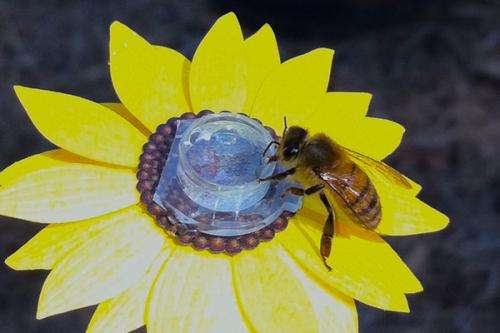Researchers discover bees are picky pollinators

(Phys.org) —Huge swaths of the agricultural industry depend on the humble honeybee. According to the USDA, "about one mouthful in three in our diet directly or indirectly benefits from honey bee pollination." Biologists at Stanford are now looking into how the tiny ecosystems in the nectar of flowers affect the bees' dining preferences. Their work suggests bees may be picky pollinators, and their fussiness could confound complications from colony collapse disorder.
In a study published in the journal PLoS ONE today, a team of Stanford researchers found that bees were fine with a little yeast in their nectar, but bacteria rendered the nectar nearly undrinkable. Interestingly, the bacteria that made the nectar almost undrinkable are also found in the guts of honeybees.
Ashley Good, a recent honors graduate in biology, led the study with Tadashi Fukami, a biology professor. They extracted three types of bacteria and yeast from the guts of honeybees found on the Stanford campus. After culturing the bacteria and yeast, the researchers put them into synthetic nectar. Then they placed the synthetic nectar, saturated with either bacteria or yeast, in fake flowers and watched what happened.
The bees did not seem to care one way or another if the nectar contained yeast. But, to the surprise of Good and Fukami, they avoided bacteria-laden nectar. The bacteria had altered the chemical composition of the nectar and made it undesirable to the bees.
"If you get rancid food, you're not going to eat it. You're going to throw it away," Good said. The bees avoided the bacteria-laden nectar as if it were rancid. Though researchers aren't sure if bees can taste nectar, the insects somehow sensed its chemical composition.
Previous work from Fukami's lab has shown that microbes in nectar influence the preferences of hummingbirds – another ubiquitous pollinator. The literature suggests that these bacteria might be widespread in nectar across the globe.
"If the bacteria affect foraging behavior of honeybees by changing the nectar chemistry, that may be one way they affect honeybee efficiency as the pollinators," Fukami said.
Fukami and Good are unsure what the relationship is between the nectar bacteria and the same species of bacteria that are found in the bee's gut. Ostensibly, these species are good or at least neutral to the bee's health, which only makes it more mysterious why the "taste" of the nectar with these bacteria would be objectionable to the bees.
Based on other research, Fukami said he thinks the bacteria nectar could be like the bee's cough syrup – it may taste bad but it might also be good for them, but only in small doses.
For example, it may be that bacteria reduce harmful toxins in nectar, and so could be indirectly beneficial to the bees. It's also possible that the presence of these bacteria in the gut could also reduce toxins from other nectars, but more research would be required to confirm that.
Whether or not the bacteria are good for the bees, Fukami and Good stress the importance of understanding bee's nectar preferences and the role microbes may play.
More information: Good AP, Gauthier M-PL, Vannette RL, Fukami T (2014). "Honey Bees Avoid Nectar Colonized by Three Bacterial Species, But Not by a Yeast Species, Isolated from the Bee." Gut. PLoS ONE 9(1): e86494. DOI: 10.1371/journal.pone.0086494
Provided by Stanford University




















